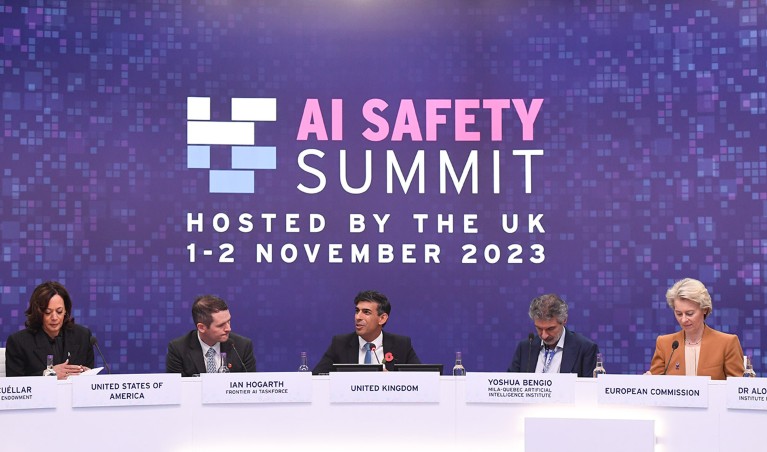Hello Nature readers, would you like to get this Briefing in your inbox free every day? Sign up here.
A high-level global summit on AI safety was held at Britain’s historic code-breaking facility in Bletchley Park.Credit: Chris J. Ratcliffe/Bloomberg via Getty
Countries begin weaving an AI safety net
The United States and the United Kingdom have made big moves towards governmental oversight of artificial intelligence (AI).
• US President Joe Biden signed his nation’s first AI executive order, with a huge swath of directives for federal agencies to guide the use of AI.
• A summit in the United Kingdom, attended by world leaders and representatives of big tech, produced the Bletchley Declaration, which pledges international cooperation to manage the risks posed by the most advanced systems.
• The United States and the United Kingdom both committed to funding expensive computing infrastructure that AI researchers need. “Right now, all of the capabilities to work with these systems is in the hands of companies that want to make money from them,” says Yoshua Bengio, an AI pioneer who attended the summit. “We need academics and government-funded organizations that are really working to protect the public to be able to understand these systems better.”
Nature | 6 min read
Reference: US executive order factsheet & The Bletchley Declaration
We smell in stereo
A region of the brain that processes information about odours knows which nostril whiffed the scent first. Researchers pumped smells into the nostrils of wide-awake people who were undergoing brain surgery and recorded neural activity in the piriform cortex. When a scent was delivered to a single nostril, the side of the piriform cortex that was closest to that nostril reacted first. Odours delivered to both nostrils resulted in faster reaction to the scent on both sides, suggesting that the sides synergize. Receiving dual signals could help the brain to double-check what it is smelling.
Nature | 3 min read
Reference: Current Biology paper
New guidelines for psychology research
The American Psychological Association (APA) has released its first recommendations for authors, reviewers and editors on how to address race, ethnicity and culture more equitably when publishing research. The guidelines build on work done by the APA to make amends for fostering racism in the United States, including the use of psychological research to support eugenics.
Nature | 4 min read
Reference: APA guidelines
Poor nations hung out to dry on climate
Poor nations are receiving only a fraction of what they need to adapt to climate change — despite being promised the money by rich countries, which are most responsible for causing the problem. “Studies show that for every US$1 billion invested in coastal flood protection, you avoid $14 billion in damages,” says climate researcher Henry Neufeldt, the chief scientific editor of a new report from the United Nations Environmental Programme (UNEP). “We have floods, droughts and heatwaves all over the world and it’s just getting worse and worse. This newest data is a wake-up call.”
Nature | 5 min read
Reference: UNEP report
Source: UNEP
Features & opinion
How rookie lab leaders can get up to speed
An array of spreadsheets, courses and online resources are available to support principal investigators leading their first research groups. “You’re used to being a scientist and now, all of a sudden, you’re a manager, you’re teaching classes and you have to physically build up your lab,” notes bioengineer Katharina Maisel. This feature is here to help, with tips to manage money better, sort out supplies, build lab culture, find a community and get leadership training.
Nature | 11 min read
The ‘right to science’ is key to survival
Science and human rights must be our guides if we are to successfully navigate “the era of ‘global boiling’”, writes Volker Türk, the UN high commissioner for human rights. “Too many governments, policymakers and big-industry leaders are wilfully shutting their eyes to science and deploying biased ‘experts’ to sow doubt and undermine scientific facts,” he argues. “Human rights are not simply laws or an ideology — they are the key to survival of our species.”
Nature | 5 min read
Make room in models for marine microbes
Understanding marine microbes — the engines that drive most marine processes — is key to forecasting the future state of the oceans, their wildlife and the food systems that depend on them, argues ocean scientist Alessandro Tagliabue. “Presently, there is little confidence in, or even consensus on, predictions of how marine microbes will react to changes in the climate,” he writes. He outlines some priority areas in which researchers in marine microbiology, physiology, biogeochemistry and modelling can join forces.
Nature | 9 min read
Where I work
Sara Abdou researches plants at Wageningen University & Research in Wageningen, the Netherlands.Credit: Francesco Rucci and Francesco Marinelli for Nature
“In this photo, I’m collecting floral tissue samples from a white petunia to analyse its pigments and the genetics behind them,” says biotechnologist Sara Abdou. Orange petunias don’t exist in nature, but in 2015, Abdou’s colleague Teemu Teeri found one growing at a railway station near Helsinki. He discovered that its colour was due to an unauthorized genetic modification, and the sale of such plants came to be banned in some countries. “I was eager to create orange petunias not by introducing a gene from another species, but by fixing the genetic pathway that stops petunias being naturally orange,” says Abdou. (Nature | 3 min read) (Francesco Rucci and Francesco Marinelli for Nature)
